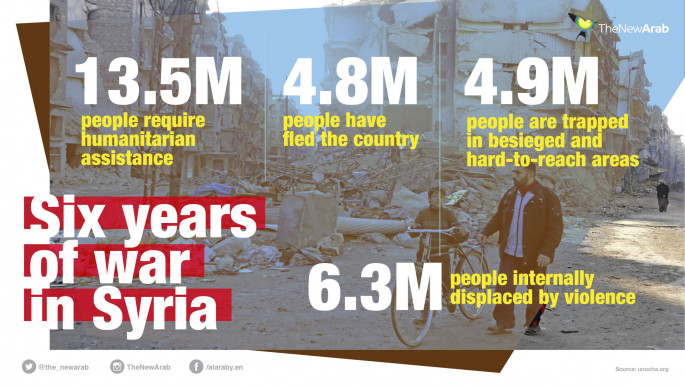Syria rebels still boycotting talks, despite Russian 'mind games'
An official from one of Syria's rebel factions has denied reports that rebels will send representatives to the current round of talks with the Syrian regime in Astana, dismissing the talks as as a ploy to buy time for the regime to make advances on the ground.
Mamoun Haj Mousa, from the Suqour al-Sham Brigade said there were no plans for factions to attend the talks, contrary to earlier reports by the Kazakhstan foreign ministry.
Another opposition official, Yahya al-Aridi, said of the Kazakh foreign ministry announcement: "Let them say what they wish", according to AP.
A foreign ministry spokesman said the rebel delegation will join consultations with Russia, Turkey and Iran in the Kazakhstan capital.
"Representatives of the southern and northern fronts (of the Syrian armed opposition) are expected to arrive tonight," spokesman Onuar Zhainakov said.
"They will hold consultations tomorrow with experts from the guarantor countries (Russia, Turkey, Iran) on the observation of the cessation of hostilities agreement."
 |
Opposition official Yahya al-Aridi said of the Kazakh foreign ministry announcement: 'Let them say what they wish' |  |
Syrian rebels had previously boycotted the third summit in Astana, citing the regime's continued bombardment of opposition-held areas in Homs and Damascus.
Aridi told The New Arab that without guaranteeing the cease-fire and preventing further breaches by the regime, ending evacuations of rebel-held areas and allowing aid to besieged areas, the outcomes of the talks were just a "new malignant lie".
Rebel sources say the talks amount to mind games by the Russians to trick the opposition into a protracted process while the regime makes strategic advances under Russian cover.
A regime delegation led by Syria's UN ambassador, Bashar al-Jaafari, began meetings on Tuesday with Russian officials in Astana.
Talks in Astana are running parallel to political talks in Geneva between the regime and the opposition.
The Astana talks are centred on cease-fire and humanitarian efforts, but have brought few results.
The current round of talks was originally scheduled to end Wednesday.
The Syrian conflict began six years ago, when the Baath regime - in power since 1963 and led by Bashar al-Assad -responded with military force to peaceful protests demanding democratic reforms during the Arab Spring wave of uprisings, triggering an armed rebellion fuelled by mass defections from the Syrian army.
According to independent monitors, hundreds of thousands of civilians have been killed in the war, mostly by the regime and its powerful allies, and millions have been displaced both inside and outside of Syria.
The brutal tactics pursued mainly by the regime, which have included the use of chemical weapons, sieges, mass executions and torture against civilians have led to war crimes investigations.
 |





 Follow the Middle East's top stories in English at The New Arab on Google News
Follow the Middle East's top stories in English at The New Arab on Google News

![Israeli forces ordered bombed Gaza's Jabalia, ordering residents to leave [Getty]](/sites/default/files/styles/image_330x185/public/2176418030.jpeg?h=a5f2f23a&itok=_YGZaP1z)
